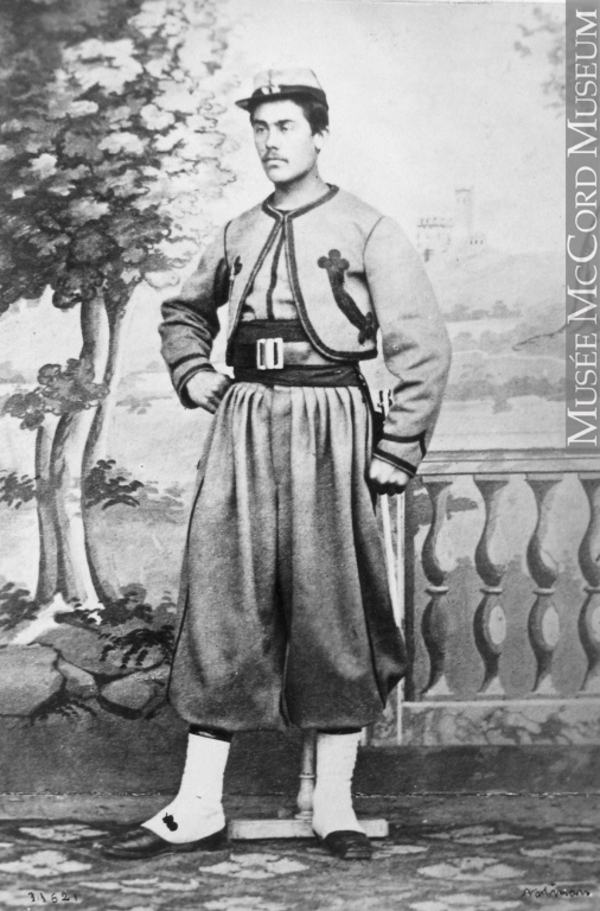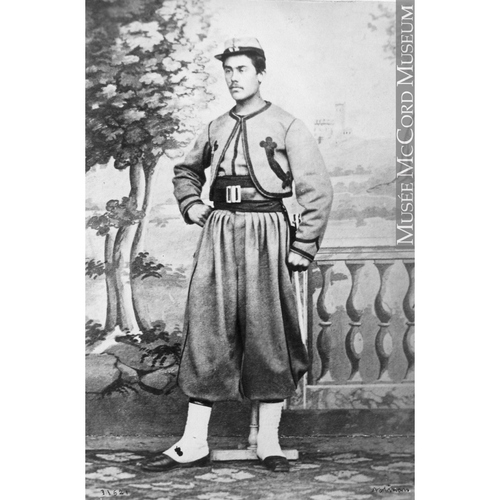
Source: Link
GERVAIS, GUALBERT, Papal Zouave and teacher; b. 23 Sept. 1844 at Berthier-en-Haut (Berthierville), Canada East, son of Nicolas Gervais, a farmer, and Catherine Tellier; d. 12 April 1888 at Montreal, Que., and was buried two days later in the cemetery of Sainte-Geneviève-de-Berthier parish in his native village.
After completing his secondary education in his native village, Gualbert Gervais entered the École Normale Jacques-Cartier at Montreal in September 1860. He remained there until 1865 and obtained the three diplomas (elementary, model, and academic) awarded by that institution. During this period Gervais maintained with the school’s principal, Abbé Hospice-Anthelme-Jean-Baptiste Verreau*, a relationship marked by respect and gratitude; indeed, throughout his career Gervais would enjoy Verreau’s support. In the beginning Verreau saw him as a candidate for the priesthood. In 1866, after many invitations, he asked Gervais to come to a decision: “I have often told you that I do not believe you were made for the world. Was I wrong? Once and for all write to me . . . plainly on this matter. I will not bother you again.” Probably influenced by his failing health, Gervais took this occasion to renounce any notion of seeking orders. In August 1867, having failed to find a teaching post, he accepted the position of secretary to the principal offered by Verreau; in addition to board, lodging, and laundry, he received the meagre salary of $4 a month.
In December 1867 Gervais enlisted in the battalion of Zouaves then being organized in Montreal to aid the Papal States, which were being threatened by the movement for Italian unity [see Ignace Bourget]. His principal motive in joining the papal army was not the difficulty of finding employment. Like most of his Zouave compatriots, Gervais was convinced above all that the future of Catholicism depended on maintaining, in Rome, the temporal power of the pope. This cause was so sacred that, in letters to his parents the following year and to the parish priest of Sainte-Geneviève-de-Berthier, he said he would not be averse to giving up his life for its sake. Hence he approached his mission in a spirit of piety and devotion. Promoted corporal in November 1869, he was assigned administrative tasks which enabled him to stay permanently in Rome; the majority of his compatriots had to pack their gear frequently and move from garrison to garrison. In other respects his life as a Zouave was quite like that of the others: after work he went to the premises fitted up for the Canadians by Chaplain Louis-Edmond Moreau, where he could make use of a games room, library, and restaurant. The numerous letters to his parents and to his benefactor Verreau, who paid for his stay in Rome, express deep admiration for Pius IX; Gervais venerated the pope as a saint. After the capitulation of Rome in September 1870 Gervais was deported to England and then repatriated with the other Canadian volunteers, who with rare exceptions had had no more opportunity than he to defend the papal territory in combat. With a touch of both regret and irony, he noted that he had served “as a hero, in an office.”
In September 1872 Gervais was taken on at the École Normale Jacques-Cartier as an assistant master, with a salary of $400 a year, plus board and lodging. From 1875 he taught arithmetic in addition to the history of Canada and the United States, and also held the post of secretary-treasurer. His salary was increased in that year to $600, and then in 1883 to $700. He received the latter sum until his death even though he had more than 15 years’ experience in the field of education. This remuneration was roughly equivalent to that received by Montreal bookbinders and printers with the same number of years of experience, judging by the average annual wages for these trades of $558 and $546, respectively, in 1891. But being a self-effacing, discreet, and meek man, he apparently did not complain. When Gervais died, Gédéon Ouimet*, superintendent in the Department of Public Instruction, observed: “Poor Gervais has made the mistake of letting himself die. All the same, he is well rid of the troubles of [this] life.” His lack of interest in the material aspects of existence and his attitude of submission in the face of death seem to have sprung from the religious faith that inspired him. As his younger brother Oscar testified: “Wherever he might be, his life was very tranquil; he lived it without ostentation, with eternity always on his mind.”
AP, Sainte-Geneviève-de-Berthier (Berthierville), Reg. des baptêmes, mariages et sépultures, 23 sept. 1844. Arch. de l’univ. du Québec à Montréal, 2P, Brouillard, 1867, 1875–88; Corr., Gualbert Gervais à ses parents, 27 déc. 1867; Napoléon Legendre à H.-A.-J.-B. Verreau, 17 sept. 1872; Verreau à Legendre, 19 juill. 1875; Gédéon Ouimet à Verreau, 13 avril 1888; Reg. des professeurs, 3: 115. ASQ, Fonds Viger-Verreau, Cartons 29, nos.223–25; 30, nos.173, 180–82, 219, 225, 249; 34, no.157. Jean De Bonville, Jean-Baptiste Gagnepetit: les travailleurs montréalais à la fin du XIXe siècle (Montréal, 1975), 90. [L.-]A. Desrosiers, Les écoles normales primaires de la province de Québec et leurs œuvres complémentaires; récit des fêtes jubilaires de l’école normale Jacques-Cartier, 1857–1907 (Montréal, 1909), 336, 377. René Hardy, “Les zouaves pontificaux et la diffusion de l’ultramontanisme au Canada français, 1860–1870” (thèse de phd, univ. Laval, Québec, 1978).
Cite This Article
René Hardy, “GERVAIS, GUALBERT,” in Dictionary of Canadian Biography, vol. 11, University of Toronto/Université Laval, 2003–, accessed December 20, 2025, https://www.biographi.ca/en/bio/gervais_gualbert_11E.html.
The citation above shows the format for footnotes and endnotes according to the Chicago manual of style (16th edition). Information to be used in other citation formats:
| Permalink: | https://www.biographi.ca/en/bio/gervais_gualbert_11E.html |
| Author of Article: | René Hardy |
| Title of Article: | GERVAIS, GUALBERT |
| Publication Name: | Dictionary of Canadian Biography, vol. 11 |
| Publisher: | University of Toronto/Université Laval |
| Year of publication: | 1982 |
| Year of revision: | 1982 |
| Access Date: | December 20, 2025 |



